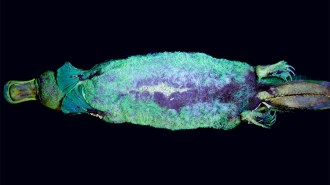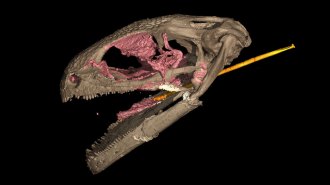All Stories
-
 Earth
EarthWith Theta, 2020 sets the record for most named Atlantic storms
Climate change is expected to fuel fewer — yet more intense — Atlantic storms. With a whopping 29 storms but few strong ones, 2020 may be an outlier.
-
 Chemistry
ChemistryA new portable device can reveal a chili pepper’s heat
The “Chilica-pod” measures levels of the fiery capsaicin compound in peppers.
-
 Science & Society
Science & SocietyThese are science’s Top 10 erroneous results
A weird form of life, a weird form of water and faster-than-light neutrinos are among the science findings that have not survived closer scrutiny.
-
 Health & Medicine
Health & MedicinePfizer’s COVID-19 vaccine is 90% effective, preliminary trial data show
An analysis of 94 COVID-19 cases shows that the mRNA-based vaccine can protect people from getting sick, though the trial is ongoing.
-
 Space
SpaceJupiter’s icy moon Europa may glow in the dark
Europa’s potential “ice glow” could help scientists map the chemical composition of its surface — and the ocean underneath.
-
 Genetics
GeneticsPenicillin allergies may be linked to one immune system gene
Researchers have located a shared hot spot — on the HLA-B gene — in the immune system in people who say they have penicillin allergies.
-
 Neuroscience
NeuroscienceFDA advisory panel declines to support a controversial Alzheimer’s treatment
The fate of an Alzheimer’s drug, developed by pharmaceutical company Biogen, remains up in the air.
-

-

In praise of serendipity — and scientific obsession
Editor in chief Nancy Shute writes about the role of serendipity and scientific obsession played in this month's feature stories.
By Nancy Shute -
 Tech
TechA smartwatch app alerts users with hearing loss to nearby sounds
With a new smartwatch app, users who are deaf or hard of hearing can get alerts that an alarm is going off or someone is knocking at the door.
-
 Animals
AnimalsA blue-green glow adds to platypuses’ long list of bizarre features
The discovery of platypuses’ fluorescent fur has researchers wondering if the trait is more widespread among mammals than anyone has realized.
-
 Life
LifeAn ancient amphibian is the oldest known animal with a slingshot tongue
A tiny amphibian that lived 99 million years ago waited for invertebrate prey before snatching them with a swift, shooting tongue.